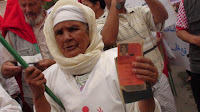In March of this year, I had the pleasure of participating in the 19th session of the UN’s Human Rights Council in Geneva. I met and worked with human rights activists from across the globe, and I was moved by their stories of injustice, persecution and oppression. Inspired by the proceedings of this meeting, I decided to write this article in order to shed light on the plight of 45,000 Moroccan families who were expelled from Algeria in 1975 in the aftermath of the Green March.
After more than thirty five years of suffering and struggle for justice, hundreds of thousands of Moroccans finally broke their silence and sued the Algerian state, in the person of its President Abdul-Aziz Bouteflika. In an effort to coordinate their activities, the displaced Moroccans formed associations and sections in many parts of the world, to better advocate for their rights. The associations are especially keen on recovering expropriated property taken by Algerian military junta, who decided to punish Moroccans for their country’s decision to reintegrate its Sahara.
Under the orders of President Houari Boumediane, Mr. Bouteflika, foreign minister at the time, carried out the expulsion without adequate notice and in abominable conditions. Entire Moroccan communities were uprooted from their dwellings in Algiers, Oran, Tlemcen, Annaba, and Constantine. In fact up until now, Algeria continues to turn a blind eye to this injustice and refuses to give the victims a satisfactory explanation for its inhuman actions.
Most of the expelled Moroccan families were very well established in Algeria. Many ran businesses, held very good jobs, owned homes and had family ties throughout Algeria. Through no fault of their own, and due to pure political posturing, their lives were demolished when all their belongings and properties were seized and their businesses closed. But perhaps the most tragic consequence of the expulsion are the emotional and mental scars left on innocent men, women and children.
Many families were also separated as a result of this tragic event. In cases of mixed marriages, children were made to stay with Algerian parents. Many have also been reported missing. At the meeting of the UN Human Rights Council, I met a Moroccan victim named Miloud. As he stated, “I was walking back from school and when I arrived home I found my family in a small Police van and was thrown on the borders of Morocco.” As with Miloud, many Moroccans still carry this bitterness of suffering and the brutal separation from their families and relatives.
When we study the political impasse between Algeria and Morocco, we normally limit it to the Sahara conflict and Polisario. Rarely do we address the tragic event for which Moroccan and Algerian families continue to pay a high price. As human beings, not Moroccans or Algerians, we should champion the cause of the victims of this unjust expulsion and echo their call on the United Nations to open an international investigation into the violations of law committed against them.



